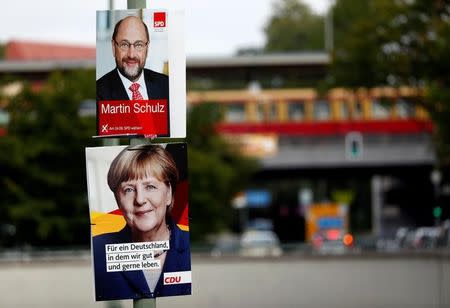"Let's get emotional" says German SPD, struggling to oust Merkel

By Paul Carrel BERLIN (Reuters) - One month away from a national election, Germany's Social Democrats are struggling in their efforts to narrow a yawning gap in support behind Chancellor Angela Merkel's conservatives. The left-leaning Social Democratic Party (SPD) is languishing on around 24 percent support, polls show, far behind Merkel's conservatives bloc, on some 38 percent. Germans go to the polls on Sept. 24. The SPD is having difficulty in differentiating itself from the conservatives, with whom it rules as junior partner in a 'grand coalition' - an alliance the party wants to avoid repeating, but which polls suggest is the only partnership that can guarantee a majority. "We need to get more emotional, to fight and force Merkel to speak in clear terms so that the differences become clear," SPD Labour Minister Andrea Nahles told business daily Handelsblatt. Nahles accused Merkel, who is campaigning for a fourth term on a platform of economic stability, of trying to cruise through the election without staking out clear positions. Last year, Germany's refugee crisis threatened Merkel. But with the migrant flow now stemmed and unemployment at a record low, she is able to project herself as an anchor of stability in an uncertain world. Trying to rock her, SPD leader Martin Schulz has grown increasingly critical of Merkel this week, accusing her of blocking his party's efforts in the ruling coalition to win better pay for temporary workers and improve workers' rights. On Thursday, Schulz takes his campaign to Essen, in the heart of the Ruhr area of North Rhine-Westphalia that was at the centre of Germany's post-war 'economic miracle' but which is now a rust-belt. Germany's most populous state, North Rhine-Westphalia has traditionally been an SPD stronghold but the party lost there in a state election in May - one of three regional votes Merkel's conservatives won earlier this year. Schulz, 61, led the SPD to a brief poll surge after the party selected him as leader at the start of the year. But the revival quickly fizzled as his campaign for 'social justice' failed to gain traction. A former European Parliament president, he cannot match the clout of Merkel, 63, gained in 12 years of experience as leader of Europe's biggest economy. Searching for another point of difference, Schulz pledged on Tuesday to have U.S. nuclear weapons withdrawn from German territory if, against the odds, he defeats Merkel. "Schulz's election campaign is jumping around so many areas that it is impossible to discern a theme," the daily Sueddeutsche Zeitung wrote in an editorial. Striking a defeatist note, Schulz said earlier this month he wanted to stay on as SPD leader even if his party loses the election. (Writing by Paul Carrel; Editing by Richard Balmforth)

